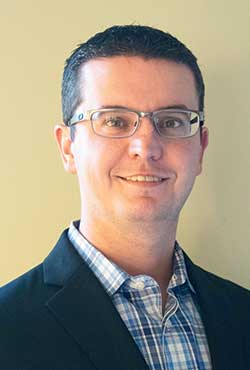Nick Pope had visions of becoming a chef while attending culinary school and working at an equipment dealership part time. He realized being a chef wasn't for him when he took a 12-hour class that ended at 2 a.m. "It put me over the edge," he recalls.
 Nick PopePope shifted gears at that point and began his foodservice industry career working for a variety of dealers, moving his way up from stocker to store manager. He joined The Boelter Companies three years ago as a project manager and now handles large projects, including many high-profile items, in the business and industry (B&I) sector.
Nick PopePope shifted gears at that point and began his foodservice industry career working for a variety of dealers, moving his way up from stocker to store manager. He joined The Boelter Companies three years ago as a project manager and now handles large projects, including many high-profile items, in the business and industry (B&I) sector.
FE&S: You're known for working with B&I feeders. Describe some trends in that space.
NP: Every job is different. Seeing various design intents and aspects of using equipment in the best way possible is exciting. Combi ovens can do many different things, where previously operators needed individual pieces of equipment. Everyone wants quick turnaround and faster cooking, and customers don't want to wait. Today's equipment can handle that type of speed of service.
FE&S: Big projects can be complicated to manage. How do you track all the details?
NP: I get a lot of support from our coordinators. Being in the field with big projects, I take it as it comes. I sit in weekly job site meetings with pen and paper in hand, take a bunch of notes, and transfer these into a spreadsheet. Then I check off tasks as they're completed. There is so much information to keep track of.
FE&S: What's your approach to equipping a kitchen when you don't necessarily know who will operate it?
NP: It's a complicated process — not knowing what the menu could potentially be or the variety of stations the operator might want. I try to specify equipment that will serve multiple needs and where the end user will have flexibility to use the equipment in different stations or areas.
FE&S: What's the most important lesson you've learned?
NP: I continuously learn from my mistakes, and strive not to make the same mistake twice. I'll be the first to admit to them, but then look at how to prevent the same mishaps in the future.
FE&S: What excites you about the future?
NP: There are two things that excite me. First, I love working with general contractors and getting to know them on a personal level. Being progressive and developing relationships with owners and operators has led to callbacks and referrals, which is a huge benefit. Also, the future of equipment is so promising. For example, ventless technology is huge and such an advantage. It's a new generation of equipment.
FE&S: Occasionally a space is smaller than realized or a piece of equipment shows up dented, etc. How do you approach resolving these situations?
NP: We stage our equipment at a local warehouse before the install to inspect it. A good 30 percent to 50 percent of the time when equipment is delivered, it sits in our warehouse for a week or two. If it's stainless steel and dented like a fryer or refrigerator, the first thing I do is contact the factory. Local reps support and fight for us, doing what they can. I'll also take photos of the damage. Typically I figure it out, whether I can fabricate something to repair it or eat the cost and order a new unit. We do what we have to do in those situations to keep the client happy.



